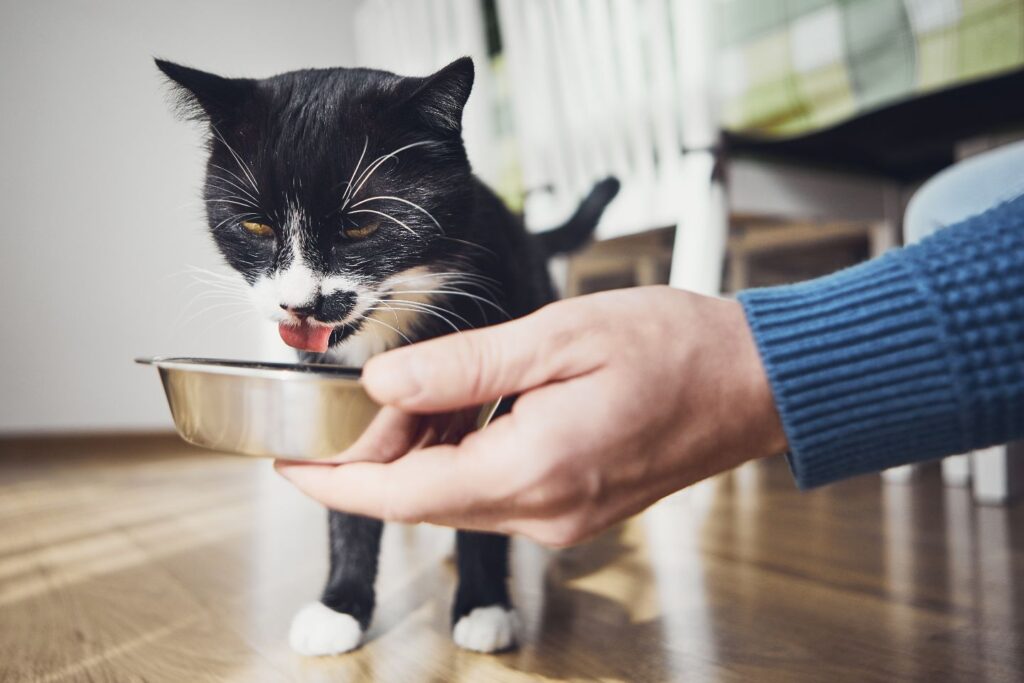Table of Contents
Mushrooms are a common ingredient in many human cuisines. So, if you have a taste for these delicious fungi, it’s not surprising that they may occasionally end up in your cat’s food.
However, there’s a lot to know before sharing mushrooms with your feline friend. That’s especially considering that cats do not naturally require fungi in their diet.
Read below for more insights into how mushrooms may affect your kitto.
Are Mushrooms Safe For Cats?
Most store-bought mushrooms are perfectly safe for cats. In other words, any mushroom species considered non-toxic to humans is potentially safe for felines too.
However, you’d want to proceed with extreme caution before feeding your cat mushrooms sprouting up in your backyard or in the woods. Many wild mushroom varieties are highly dangerous for humans. That makes them potentially more toxic to felines, considering that cats have relatively smaller bodies.
It’s also worth noting that even store-bought mushroom shouldn’t be fed to cats in excess. Too much mushroom in your cat’s stomach could trigger a number of adverse effects.
Do Mushrooms Constitute a Cat’s Natural Diet?
Mushrooms are fungi, and fungi are technically plants.
Now, cats are obligate (true) carnivores whose main diet should comprise mostly meat. The mere fact that mushrooms are fungi means they’re not considered part of a cat’s natural diet. Therefore, they may not really provide your cat with much of the nutrients he needs for healthy growth and development. Besides, feeding mushrooms to your cat in excess might trigger gastric irritation and other undesired effects.
But there’s always an exception to every rule, including this one (pun intended).
While mushrooms are not a staple ingredient in feline diets, your cat is unlikely to drop dead from eating non-toxic mushroom species. Besides, these fungi boast numerous nutrients that cats might benefit from in one way or another.
How Might Mushrooms Benefit Your Cat?
Mushrooms are a low-fat, low-calorie, and cholesterol-free food. That speaks to their potential for aiding weight loss. You can share these fungi with your feline friend as an occasional snack without worrying about him packing up extra weight.
Mushrooms are also a low-sodium food. On the contrary, they are rich in potassium. Low-sodium, high-potassium diets are noted for their positive effects on the heart and cardiovascular system. Such foods may also support muscle and nerve functions.

1. Fiber
Dietary fiber supports digestion by improving stool consistency. It also promotes weight loss due to its incredible filling effects. Besides, fiber-rich diets can lower the risks of heart disease and metabolic disorders.
Mushrooms are particularly high in beta-glucan, a type of soluble fiber associated with improving cholesterol levels in the body. Studies indicate that supplementing with beta-glucan can help fight heart disease, regulate blood sugar levels, and minimize the risks of type-2 diabetes.
2. B-vitamins
Mushrooms are high in several B vitamins, including vitamin B2 (riboflavin), vitamin B3 (niacin), and vitamin B5 (pantothenic acid).
Riboflavin is essential for red blood cells formation and functioning. Niacin promotes healthy skin and digestive system.
Lastly, pantothenic acid can support your cat’s nervous system while also regulating the signaling of important hormones and neurotransmitters. This particular B-vitamin is necessary for maintaining mental health.
Collectively, the B vitamins in mushrooms can support your cat’s heart and cardiovascular system.
3. Copper
Copper is necessary in the manufacture of red blood cells. So, if you’re worried that your cat could be suffering from blood circulation disorders, you might consider giving him copper-rich supplements like mushrooms.
Copper is also involved in many other important processes in the body, including maintaining bones and the nervous system.
Why Do Cats Love Mushrooms?
Cats have a high affinity for mushrooms, a behavior that boggled scientists for many years. It turns out mushrooms contain a lot of glutamate, an amino acid that gives these fungi their distinct umami tastes.
Cats may not be able to taste sweet flavors. But they have tons of umami taste buds.
Therefore, the reason your cat may instantly fall in love with mushrooms has everything to do with the savory umami flavors in these fungi.
What Mushrooms Can Cats Eat?
Cats can eat most common mushrooms found in grocery stores. They include;
• Beech mushroom
• Cremini mushroom
• Enoki mushroom
• Hedgehog mushroom
• Maitake mushroom
• Oyster mushroom
• Portobello mushroom
• Shiitake mushroom
• White button mushroom
What Mushrooms Can’t Cats Eat?
Cats shouldn’t eat any wild mushrooms unless you can vouch for its safety. Below are mushroom varieties considered most toxic to cats;
• Angel’s wings (Pleurocybella porrigens)
• Deadly webcap (Cortinarius rubellus)
• Death cap (Amanita phalloides)
• Destroying angel (Amanita virosa)
• Fool’s funnel (Clitocybe rivulosa)
• Funeral bell (Galerina marginata)
• Panther cap (Amanita pantherina)
There’s also a group of mushrooms known as magic mushrooms. These aren’t inherently toxic to cats. But they contain psilocybin, a psychoactive chemical that can cause psychedelic effects, such as hallucinations.
What Happens If A Cat Eats Toxic Mushrooms?
Toxic mushrooms can easily trigger gastrointestinal issues in cats. Symptoms include vomiting, diarrhea, upset stomach, flatulence, and abdominal cramping. Depending on the degree of exposure, your cat could also develop inappetence, dehydration, lethargy, and tremors.
Toxic mushrooms are also associated with nephrotoxicity in cats. In other words, these fungi can affect your cat’s kidneys. Common symptoms to expect include unexplained changes in urine habits and appearance, changes in thirst drive, weakness, and tremors.
Certain mushrooms have also been linked to hepatotoxicity (liver damage) and neurotoxicity (nerve damage). Lethargy and jaundice (yellowing of the skin) are the tell-tale signs of liver damage while incoordination, disorientation, tremors, and seizures suggest neurotoxicity.
It’s prudent to contact your vet immediately if your cat develops any of the above-listed symptoms of mushroom poisoning.
Wrap Up
Cats can eat most store-bought mushrooms. But we cannot say the same about wild mushrooms.
It’s important to proactively reduce your cat’s exposure to toxic mushrooms by eliminating these fungi from your yard. Also, remember to discuss with your vet before introducing your cat to non-toxic mushrooms.



